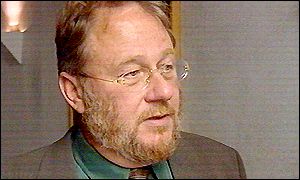
It will be several weeks before a tribunal panel decides whether BBC Radio Wales dropped an English presenter because of racial discrimination.
Judgement was reserved on Wednesday in the case of award-winning natural history broadcaster Lionel Kellaway, who claims his contract was not renewed by the station in 1999 after 15 years because he was English.
Mr Kellaway, 60, of Whitemill, Carmarthenshire, said a brief calling for a “strong Welsh voice” in environmental programmes meant someone who sounded Welsh, and he is claiming unfair dismissal.
Former station commissioning editor Daniel Jones, 43, denied the allegation and told the industrial tribunal at Shrewsbury he ended Mr Kellaway’s long-running ‘Landmark’ programme last year because it had become “tired and out of touch” with the target audience and had no new ideas.
He said he was looking to boost the number of listeners and reflect the changing attitudes and concerns of people in Wales after devolution.
He had “no problem” with the quality of work produced by Mr Kellaway who now works for Radio 4.
‘Accent on agenda’
Jason Galbraith-Marten, for Mr Kellaway, said in his closing speech his client was a “world authority” on natural history in Wales and was adaptable and flexible.
He said: “Mr Kellaway was not recommissioned for 2000/2001 not solely, but effectively because of his English national origin. He was perceived as being English.
“There was certainly a feeling at that time that Mr Joneswanted to get rid of easily identifiable English speakers. There was a feeling that accent at the station was on the agenda.”
Mr Kellaway’s case has been backed by the Commission for Racial Equality.
Gillian Keane, for the BBC, told the panel there was no evidence of racial discrimination and the organisation had a “very open mind” about race and employed non-Welsh people and those without Welsh accents.
“There was no discrimination on the grounds of national origin. There is some evidence that some people at the BBC felt that a Welsh accent was a goodthing,” she said.
“In the context of broadcasting, an interest in the Welsh accent does not have the same implications it might carry elsewhere.
“There is a large number of presenters who have English accents and some of them were brought in specifically by Mr Jones.”
On Tuesday, Daniel Jones told the tribunal that, at a time of major upheaval in Wales, a programme featuring greater crested newts in a Carmarthenshire river was not what people on the streets were talking about.
‘Declining audience’
He said that when he took up his job in 1998, he felt Radio Wales was an “old people’s station” and the decline in audience figures had been persistent and deep-rooted.
His strategy had been to change the focus and get the station in touch with the communities it served.
Mr Jones – who left the BBC earlier this year – stressed that his reference to a “strong Welsh voice” was used in a metaphorical sense and did not mean a presenter had to have a Welsh accent.
He rejected a claim, made earlier by a freelance broadcaster Phil Rickman, that a producer had been told to drop an interviewee because the person was “too English” and to talk instead to someone with a Scottish accent because at least he was a celt.
Stuart Williams, chairman of the tribunal, said the decision would be reached in several weeks.